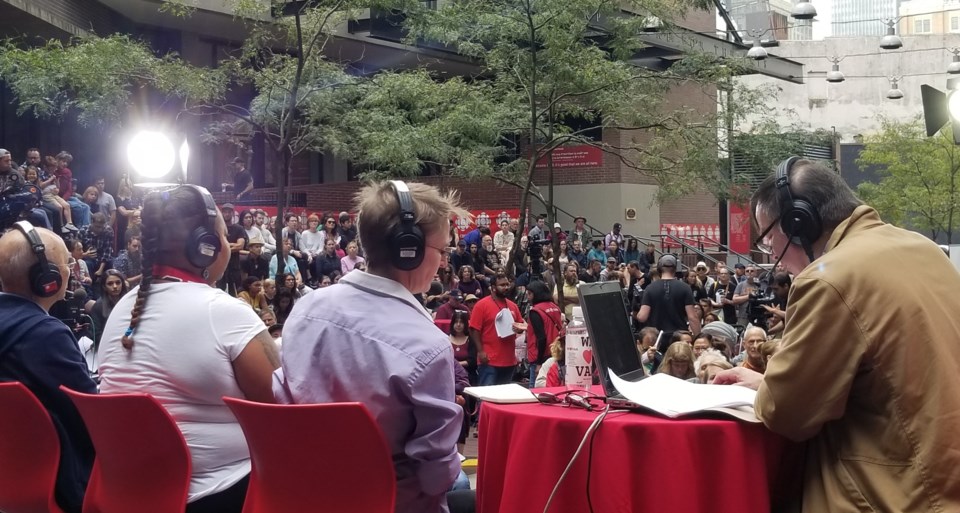If you are sitting in the bathtub with the hot water running, how do you know when to shout?
Or in other words, when is enough, enough?
This was the underlying theme of a town hall forum on despair, addiction and poverty in Vancouver’s Downtown Eastside, organized by CBC British Columbia this past Saturday at the Woodward’s building courtyard.
Hosted by the Early Edition’s Stephen Quinn, the event attracted hundreds of neighbourhood residents, politicians, community activists, media and interested citizens concerned about the worsening conditions in the Downtown Eastside.
The forum followed increasing media coverage about the Downtown Eastside community over the past month and a half, which included a mid-July by the Courier’s Mike Howell about the Patricia Hotel.
It reported onhow an increase in public disorder outside the doors of this family-run tourist hotel was negatively affecting business. The manager had taken the unusual step of appearing before the �鶹��ýӳ��Police Board asking the police and city officials to do something about it.
Forum attendees, and those listening and watching on a live podcast, heard how overdose deaths, homelessness and mental illness affect all communities in British Columbia. However, in Vancouver's Downtown Eastside, these problems are extremely concentrated.
While for decades, there have been serious problems in the Downtown Eastside, long-time residents told the audience that recently there has been a rise in crime, a worsening of the addictions crisis and greater homelessness than in the past.
Not surprisingly, most speakers called upon all levels of government to dramatically increase the supply of affordable housing. There were also repeated calls for the federal government to change its drug policies and laws to allow for a safe, legal, drug supply, noting that illegal contaminated drugs are killing too many and causing thefts and petty crime around the city as addicts seek money to pay for their habits.
Some argued that if the federal government won’t change its policies, the city should do something on its own to address these problems.
While Mayor Kennedy Stewart did not attend the forum, he was subsequently interviewed by Quinn who asked if he had been surprised by hearing anything new. The mayor’s response surprised me.
He said it was the first time he had heard the neighbourhood referred to as a ghetto.
During the interview, the mayor again committed to continue working with the federal government to obtain more housing funding and indicated he would discuss with Ottawa whether �鶹��ýӳ��could get an exemption from federal laws to allow for a safer supply of drugs.
He confided that he had had a private conversation with Prime Minister Justin Trudeau on this matter and was hopeful something might happen after the federal election. I presume that Stewart presumes the Liberals are going to win.
Since my two previous Courier about the worsening conditions in the DTES, I have had numerous conversations with others much more knowledgeable than me about the challenges facing the neighbourhood and possible solutions. Here is some of what I have heard:
Hundreds of millions of dollars are being spent by governments and social service agencies in the community. However, little cost-benefit analysis has been carried out to determine which programs may be working, and which are not.
It is essential to collect more data, along the lines of that set out by former �鶹��ýӳ��Sun columnist Pete McMartin in a sobering 2016 article titled
Decriminalization of all drugs may be the only real answer for this community. Given the many dealers who openly prey on the helpless, what is needed is to replace the “war on drugs” with a “war on thugs.”
The concentration of low-income, homeless, drug-addicted and mentally ill people is leading to greater disease and drug addiction in the community. We need to disperse some of the population and social services to other parts of the region to make the DTES a more normalized part of the city.
Sadly, some believe that for many, it may be too late to find solutions. However, society must start to do more to prevent future homelessness and drug addiction while many are still young.



